Table of Contents
Ahrefs
Ahrefs is one of the most powerful all-in-one ecommerce SEO tools available. For ecommerce sites, it’s a must-have. It crawls your website, tracks keyword performance, analyzes backlinks, and gives you a clear view of what’s driving success for your competitors.
It’s a staple in nearly every SEO toolkit for good reason. Ahrefs doesn’t just show you data. It helps you turn that data into actionable insights that drive rankings, traffic, and revenue.
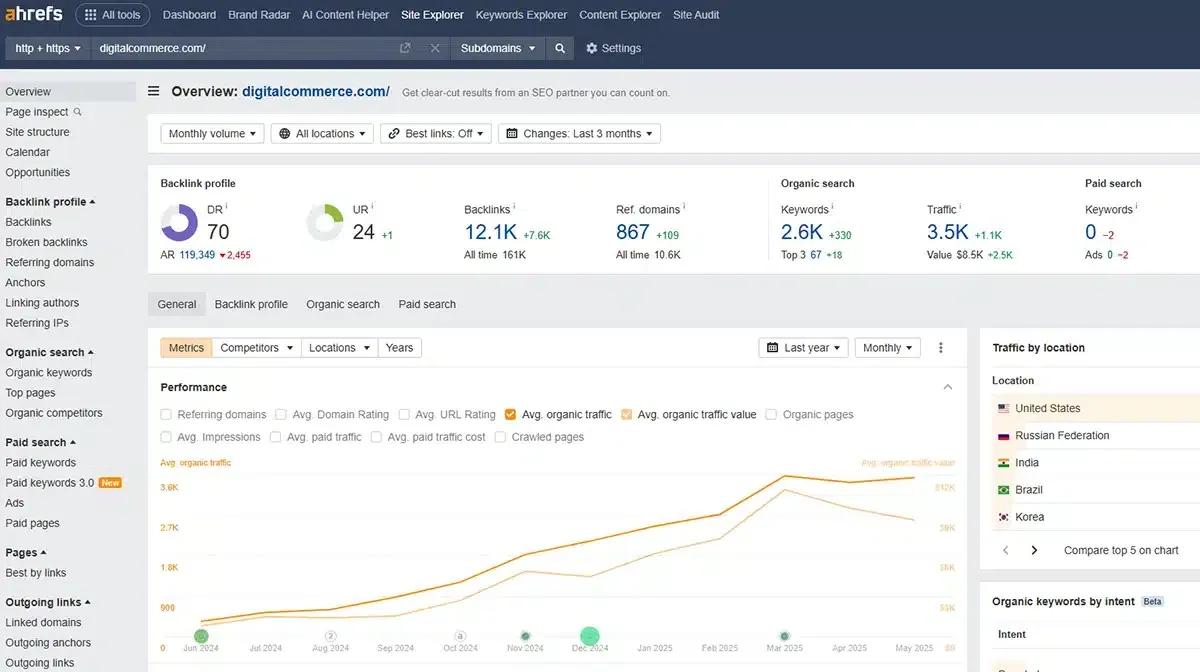
What does it do?
Almost everything short of ranking your ecommerce website for you. It’s like having an all-in-one toolkit for your ecommerce website. Here’s what it offers:
- Site Audit: Identifies technical SEO problems like broken links, duplicate content, and slow page speeds.
- Keyword Tracking: Monitors your rankings across product, category, and blog pages to show what’s improving and needs attention.
- Competitor Analysis: Reveals which keywords and backlinks work for your competition, helping you find content and product opportunities.
- Keyword Research: Surfaces new keyword ideas, including long-tail, high-intent terms ideal for ecommerce.
- Backlink Analysis: Evaluates your site’s backlink profile so you can strengthen domain authority with strategic link-building.
- Content Explorer: Helps you identify top-performing topics in your niche and improve your blog content to support product discovery.
And that’s just the beginning. It’s packed with many more features to supercharge your site’s performance.
Why Ahrefs matters for Еcommerce
Ahrefs isn’t just useful, it’s a strategic advantage for ecommerce businesses. It gives you the data you need to make informed, revenue-driven decisions. Here’s what it helps you uncover:
- Ranking Opportunities: Identify high-potential pages that can be optimized for better traffic and visibility.
- Competitor Insights: See which keywords and pages work for your competition, and how you can do it better.
- Stronger SEO Foundations: Build a scalable SEO strategy rooted in real data, not guesswork.
- Product and Collection Growth: Find out which products or categories have untapped search potential.
- New Collection Ideas: Discover emerging search trends and create category pages to match buyer intent.
How expensive is it?
Ahrefs plans currently start from $129 a month. The price can increase significantly depending on what features and how often you want to use it.
In all honesty, while it’s one of the best SEO tools for ecommerce, it’s expensive, especially for small businesses. But once you get that revenue rolling, it is worth the money. I would suggest building a working ecommerce store initially before you open your wallet for this big-budget bazooka.
Semrush
Semrush is the main rival of Ahrefs, and honestly, it’s just as good. It’s an all-in-one SEO and digital marketing toolkit that’s especially valuable for ecommerce teams juggling both organic and paid strategies.
While Ahrefs focuses heavily on backlinks and technical SEO, Semrush stands out with deeper marketing integrations and PPC features. If your store runs Google Ads or you’re balancing SEO with paid acquisition, Semrush might be a better ecommerce SEO tool for you.
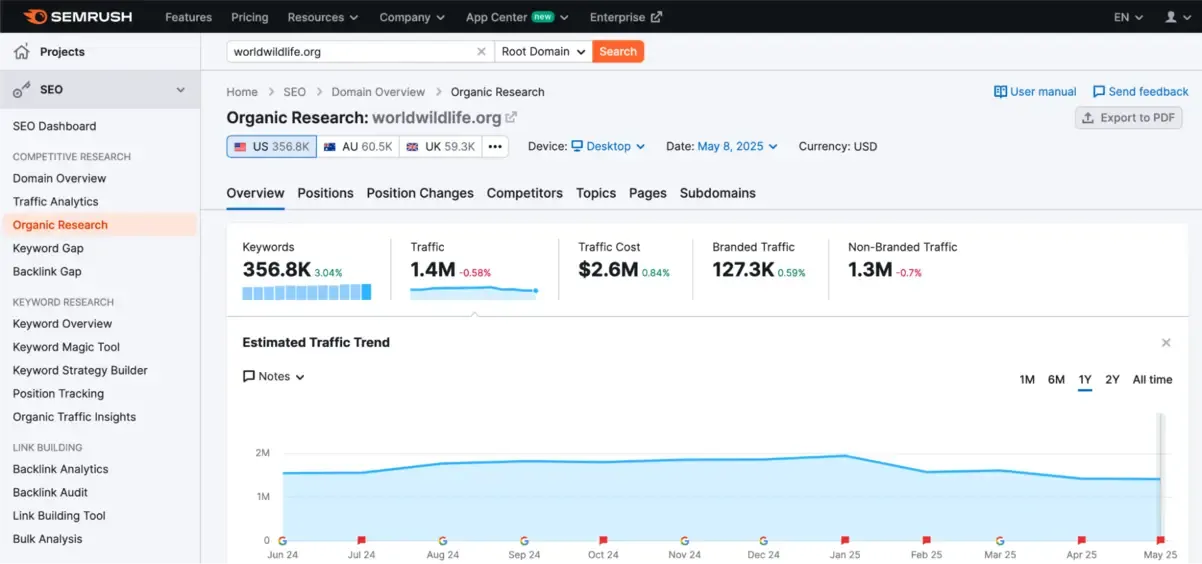
What does it do?
If you liked Ahrefs, you’ll also appreciate Semrush. It’s a feature-packed suite including:
- Keyword Magic Tool: Unearth new keywords, analyze volume, competition, and trends.
- Site Audit: Comprehensive SEO audit revealing technical issues and improvement areas.
- Competitor Analysis: Detailed breakdown of competitors’ rankings, keywords, ads, and more.
- SEO Content Templates: Get content recommendations based on successful competitors.
- Advertising Insights: Dive into PPC strategies and ad research.
It’s like Ahrefs, but with a stronger marketing and PPC twist.
Why Semrush Matters for Ecommerce SEO
Semrush is more than just an SEO tool. It’s a full-blown marketing assistant for ecommerce brands that want to scale smart.
It’s especially useful if your strategy blends content marketing, SEO, and paid ads. While Ahrefs is my go-to for backlinks and content audits, Semrush brings extra firepower when juggling multiple traffic channels.
Here’s how it helps ecommerce brands grow:
- Maximize Keyword Coverage: Discover high-intent keywords for product and collection pages, plus trending searches that fuel blog content and shopping guides.
- Understand Your Market: Analyze competitors’ organic and paid strategies to spot gaps in your own.
- Create Smarter Content: Use SEO Content Templates to build pages based on what’s already ranking, then tailor your content to outrank the competition.
- Track and Adapt: Monitor SEO and PPC performance so you know what’s working and where to reinvest.
How expensive is it?
Semrush isn’t cheap, starting from $139.95 per month. Like Ahrefs, the price quickly rises as your needs expand. If the budget is tight, consider holding off until your store generates decent revenue. It’s a high-quality investment you won’t regret, but don’t rush it if you’re just starting out.
Ultimately, unless you are an SEO agency, you only need one full-suite SEO tool. Both Semrush and Ahrefs are well worth it, and it is a matter of preference which one you should choose.
Screaming Frog
Screaming Frog isn’t like Ahrefs or Semrush. It’s not flashy, nor is it a cloud-based ecommerce seo tool. It’s an SEO crawler you download onto your PC.
In my humble opinion, it’s the best thing ever invented after roll-on deodorant. It’s affordable, has practically unlimited options, and the team behind it is really cool.
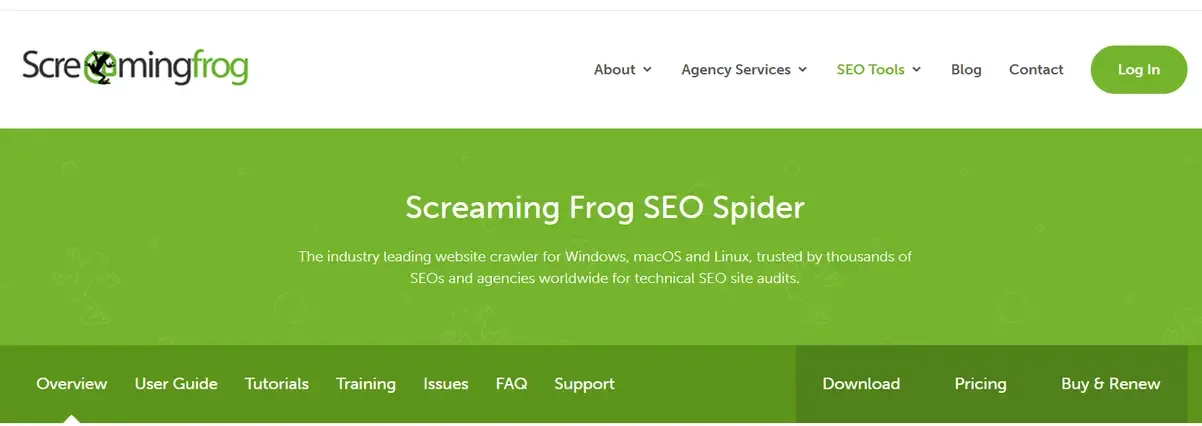
(I’m such a fan that the team sent me stickers in the past.)
What does it do?
It crawls. That’s its thing. Your site, your competitor’s, a list of URLs, or even a whole Google SERP. If you can feed it, the spider frog will crawl it. Here’s a peek at where it shines:
- Full Technical Site Audits: Quickly scans your entire ecommerce site, flagging broken links, redirect chains, duplicate content, and more.
- Detailed SEO Reports: Surfaces issues like missing title tags, messy H1 structures, bloated pages, and slow-loading assets that hurt performance.
- Sitemap & Robots.txt Validation: Makes sure your key pages aren’t accidentally blocked and that your sitemap is clean, complete, and crawlable.
It’s less about content strategy or keyword tracking and more about pure diagnostics. If Ahrefs and Semrush are your strategy tools, Screaming Frog is the mechanic under the hood.
Want to fix technical SEO issues before they tank your rankings? This is the tool you start with.
Why Screaming Frog Matters for Ecommerce
Technical SEO isn’t optional when you’re running an ecommerce store. You’ve got hundreds, or even thousands, of pages, and if search engines can’t crawl or index them properly, you’re leaving money on the table.
Screaming Frog helps you stay ahead of those issues by giving you a full diagnostic of what’s going wrong under the hood. Here’s why it matters:
- Improve Crawling Efficiency: Spot crawl traps, orphaned pages, or bloated navigation that can confuse Google and waste crawl budget.
- Reduce Bounce Rates: Fix broken links, redirect loops, and page speed issues that drive shoppers away before they even see a product.
- Enhance Indexability: Make sure that your most important pages—like category and product pages—are fully accessible and properly structured for search.
When your site is technically sound, everything else performs better. Screaming Frog gives you the clarity and control to make that happen.
How expensive is it?
Here’s the good news: Screaming Frog is refreshingly affordable.
You can use it for free if you crawl fewer than 500 URLs. It’s perfect for smaller ecommerce sites or spot checks. Need more horsepower? The paid version is about $279, unlocking unlimited crawling and many advanced features.
For the value it delivers, it’s a no-brainer. Even early-stage stores can benefit from having this in their toolbox. If you’re serious about fixing technical SEO issues before they turn into traffic drops, this tool is worth grabbing early.
Google Search Console (GSC)
If you care about organic traffic (as you should), Google Search Console is non-negotiable. It’s a free tool straight from Google that helps you understand how your site shows up in search and what you can do to improve it.
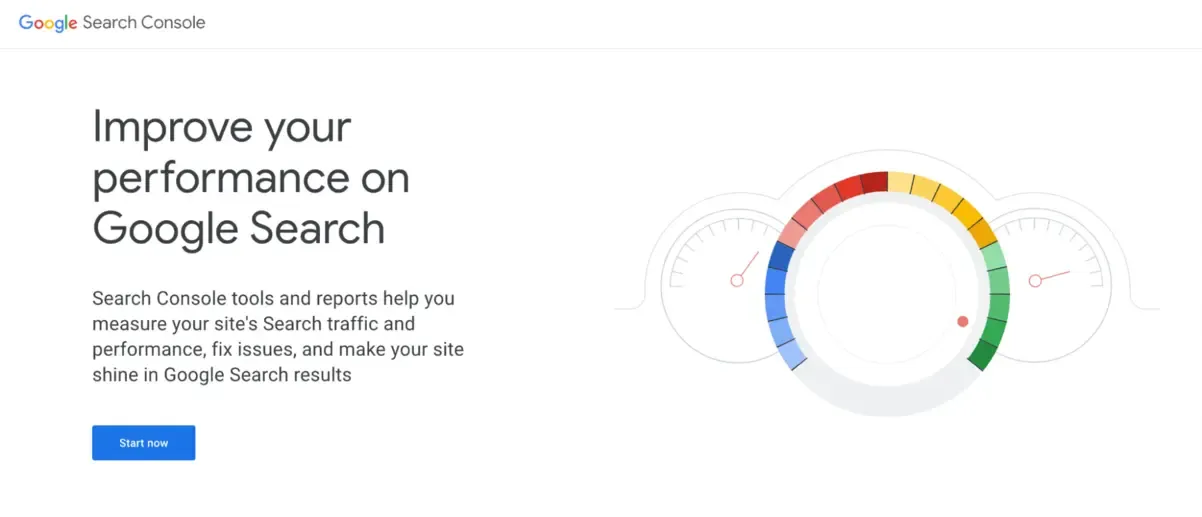
Think of it as your website’s report card, written by Google itself.
What does it do?
GSC gives you a front-row seat to how Google views your site. Here’s what you get:
- Keyword Performance: See which queries bring people to your site, how often you show up, how many clicks you get, and where you rank - all straight from the source.
- Technical Reports: Get alerts about crawl errors, indexing problems, and mobile usability issues before they start costing you traffic.
- Core Web Vitals: Track real user data around load speed, interactivity, and layout stability. This stuff affects rankings, so don’t ignore it.
- Sitemap Submission: Let Google know where your important pages are and get them indexed faster. No more guessing.
It’s simple and absolutely essential for any ecommerce site that wants to show up and stay visible in search.
Why Google Search Console Matters for Ecommerce
This is your direct line to Google. No middlemen, no guesswork.
For ecommerce sites, where every product page counts, GSC gives you the kind of insights you actually need to make smarter SEO decisions:
- Instant Insights: See what’s ranking, what’s getting clicked, and what’s falling flat so you can adjust fast.
- Free SEO Wins: Spot technical issues and indexing problems that are easy to fix but make a big impact.
- Track Product and Category Performance: Monitor how individual product pages and collection pages perform over time, and catch problems before they affect sales.
If you care about organic traffic (and conversions), this tool belongs in your stack.
How expensive is it?
Completely free. Zero. Zilch. There’s no excuse for not having it. You should set this up immediately, right after launching your ecommerce store.
Bing Webmaster Tools
Bing Webmaster Tools is basically Google Search Console’s lesser-known sibling, but don’t write it off. It does everything GSC does, just for Bing. And while Bing isn’t as big as Google, it still drives a surprising amount of traffic, especially from Microsoft devices and voice search.
If you’re building a complete SEO strategy, this belongs in your toolkit.
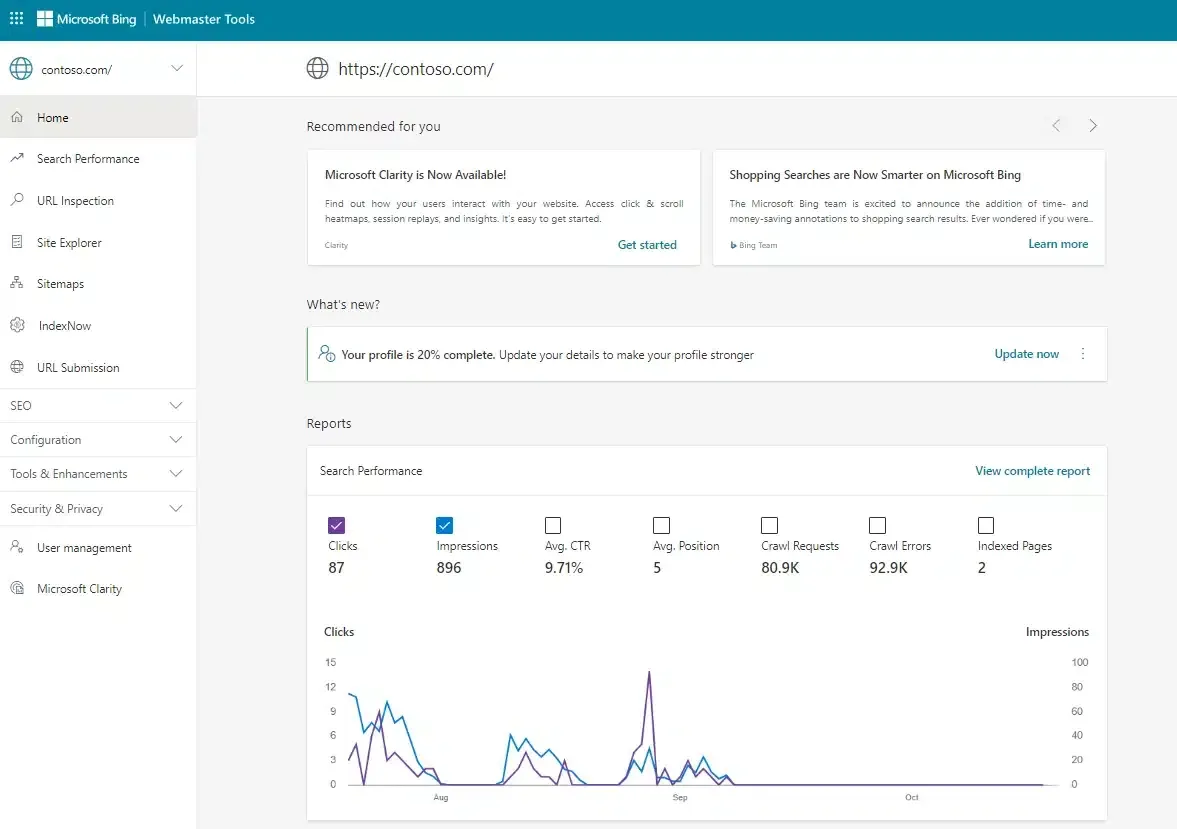
What Does It Do?
Same core features as GSC, but for Bing’s search engine:
- Site Performance: Track your site’s rank and performance in Bing search results.
- Technical SEO Reports: Spot indexing issues, crawl errors, and sitemap problems.
- Keyword Insights: See which search terms bring Bing users to your store.
Why Bing Webmaster Tools Matters for Ecommerce
It’s easy to ignore Bing, but smart ecommerce teams don’t.
- Wider Reach: Bing powers Microsoft Edge, Yahoo search, and many voice assistants. Your competitors might be missing that user base.
- Quick SEO Wins: Less competition means easier rankings. If you’re optimizing content anyway, why not get extra traffic for free?
How Much Does It Cost?
Nothing. Completely free.
There’s no downside here. Set it up right alongside Google Search Console and make sure your ecommerce site is fully covered across the search landscape.
Answer the Public
Answer the Public is one of those tools that feels too simple to be this useful. It turns keyword data into actual questions people are typing into search, making it gold for content planning.
This tool makes it easy to write product descriptions, blog posts, or FAQ sections that match what your customers care about.
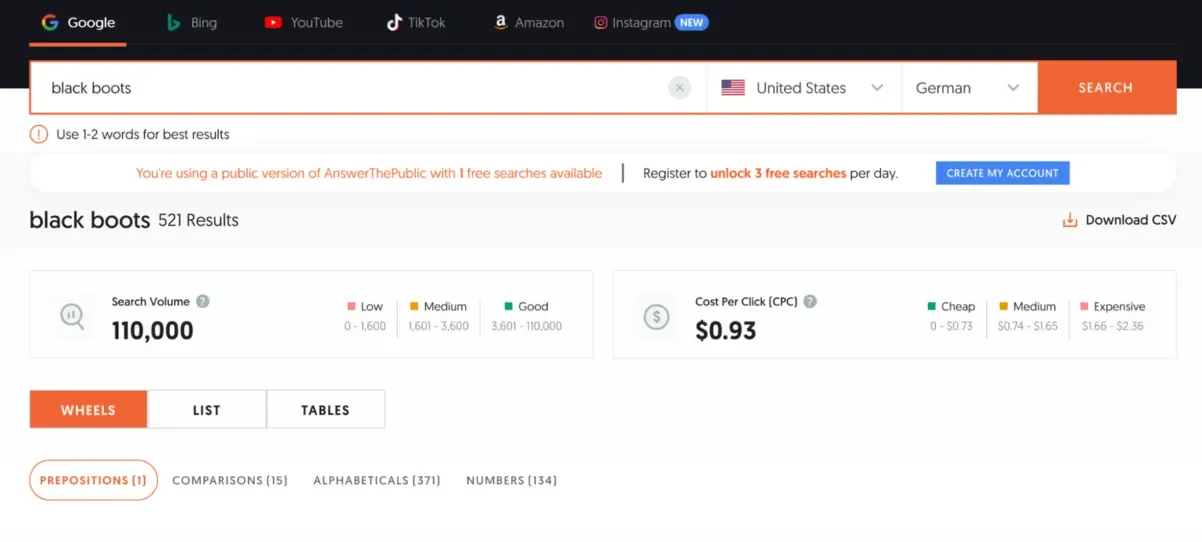
What Does It Do?
It pulls real search data and turns it into easy-to-scan question clusters. Here’s what you get:
- Content Ideas: Instantly surface blog topics, product questions, and content gaps based on real searches.
- User Intent Clarity: Understand the actual questions behind keywords - so you can answer them and earn clicks.
Why Answer the Public Matters for Ecommerce
You’re not just selling stuff. You’re solving problems. And the better you speak your customer’s language, the more likely they are to buy.
- Stronger Product Content: Create product and category pages that answer buyer questions and build trust.
- SEO-Optimized FAQs: Capture long-tail traffic by answering specific queries directly on your site.
If you want content that ranks and converts, this is one of the easiest tools to help you get there.
How Much Does It Cost?
There’s a limited free version, which is great for quick wins. Paid plans start at $11/month. Once your content strategy matures and you’re focused on scaling organic traffic, it’s worth investing in.
PageSpeed Insights and GTmetrix
These two tools do one job really well: they tell you how fast your site loads and what’s slowing it down. I’m bundling them together because they serve the same purpose, with slightly different vibes.
PageSpeed Insights comes straight from Google. GTmetrix gives you a bit more detail and lets you test from different locations. Use both, compare results, and fix what’s dragging your store down.
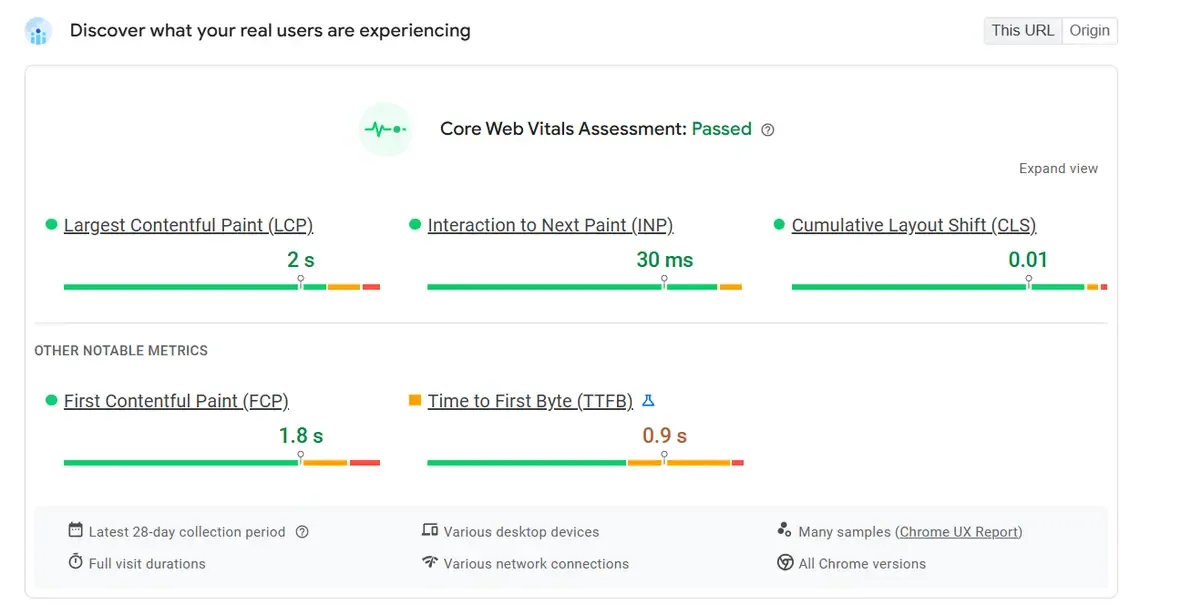
Why Both Matter for Ecommerce
Slow stores don’t just frustrate users, they cost you sales.
- Boost Conversions: Fast-loading pages reduce bounce rates and keep shoppers moving toward checkout.
- Improve SEO: Google rewards fast websites with better rankings. Simple as that.
Speed matters even more on mobile, and most of your traffic is probably coming from phones. If your site drags, people won’t wait around.
How Much Does It Cost?
Both tools are completely free to use.
You’ll get a ton of insights without paying a cent, so there’s zero excuse not to start using them from day one. Run regular checks and fix the issues as they add up fast.
Best Shopify SEO Tools You Should Know About
When it comes to getting your Shopify store to rank higher in search results, relying solely on keyword research tools isn’t enough. To truly compete in search rankings, you also need the right SEO functionality within your Shopify CMS.
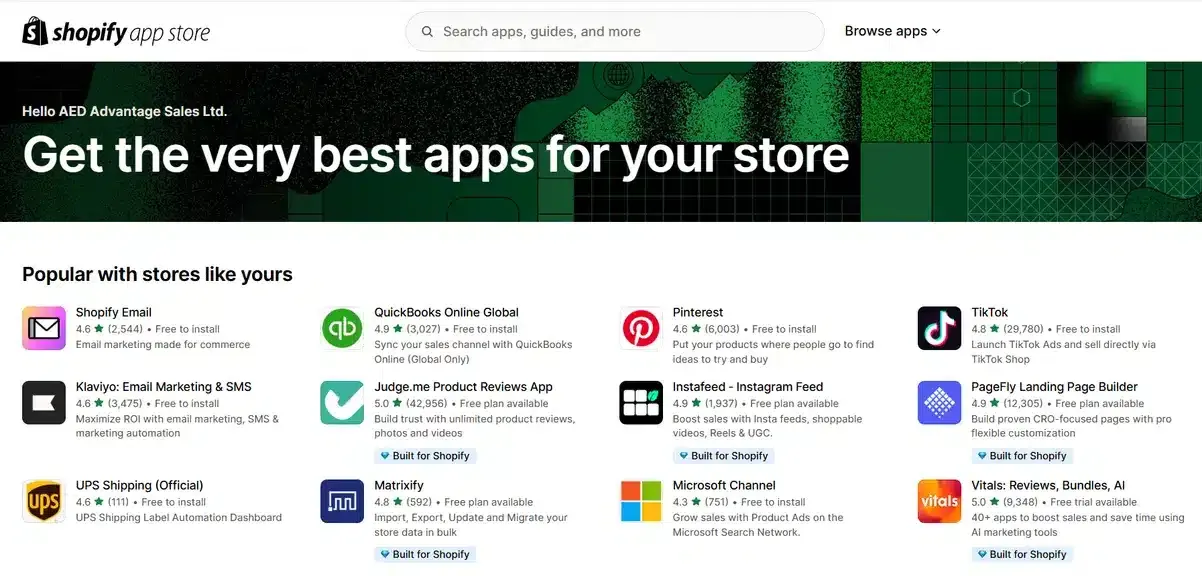
These Shopify apps help you fine-tune technical elements like metadata, URL structure, schema markup, and site speed. Here’s a quick rundown of the ones worth checking out:
Tiny SEO Speed Image Optimizer
Tiny SEO Speed Image Optimizer compresses images to speed up your site. Cheap, easy, and essential.
Pricing: $14/month.
Because every Ecommerce site deserves great product photos, but not every customer deserves to load 5MB+ images.
Magical XML/HTML Sitemap
Magical XML/HTML Sitemap instantly generates SEO-friendly sitemaps that help search engines quickly discover your products. Simple and budget-friendly.
Pricing: $1/month.
Once you have your sitemap, simply submit it directly to Google Search Console to improve indexing and visibility.
Yoast SEO for Shopify
Yoast SEO for Shopify is a Shopify integration of the famous WordPress plugin. Helps you improve SEO readability, product metadata, and more.
Pricing: $99/year.
You get a helping hand for every on-page element with this tool!
Judge.me
Judge.me builds trust and boosts conversions by helping you collect customer reviews and showcasing them on your Shopify store in an SEO-friendly way.
Pricing: Free plan available; premium from $15/month.
What people have to say about your products is probably the most important factor for conversions. Make your life easy having a product review plugin at your fingertips.
GP JSON-LD Schema for SEO
GP JSON-LD Schema for SEO sdds schema markup automatically, enhancing search result visibility.
Pricing: $8.99/month, highly recommended.
Schema markup is essential for your product pages! This little tool will help you generate schema and control how your products appear on the SERP.
Best SEO Plugins for WooCommerce/WordPress:
Running your store on WordPress and WooCommerce? These plugins will help tighten up your SEO, improve speed, and boost visibility, all without needing a developer on speed dial.
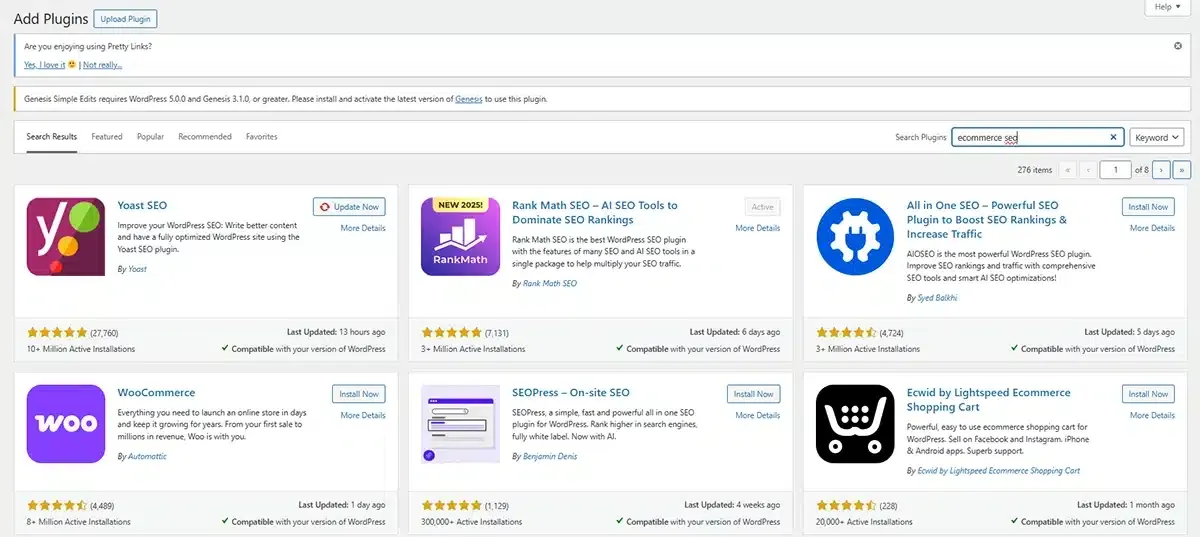
Rankmath
Rankmath is a comprehensive SEO toolkit that’s beginner-friendly but packed with advanced ecommerce features.
Pricing: Free; Premium from $83.88/year.
You can easily edit meta titles, descriptions, and robot tags, view SEO scores for each page, and enable rich snippets like product ratings right from your dashboard.
Yoast SEO
Yoast SEO is the classic SEO plugin known for optimizing readability and ecommerce content.
Pricing: Free; Premium from $99/year.
Yoast and Rank Math cover similar ground, but the user interface and workflow differ. Try both and stick with the one that fits your style.
SmartCrawl
SmartCrawl streamlines technical SEO tasks and improves overall page performance.
Pricing: Freemium; Premium from $36/year.
Automates SEO tasks like meta tags, sitemaps, and social previews. A good pick if you want set-it-and-forget-it optimization.
WP Rocket
WP Rocket drastically improves loading speeds. Worth every penny.
Pricing: $59/year.
Not sure what to do with terms like “Caching”, “First Contentful Paint”, and “Speed Index”? That’s where WP Rocket comes in. Just install it, configure a few settings, and enjoy faster load times.
Really Simple SSL
Really Simple SSL easily switches your site to HTTPS, which is essential for trust and rankings.
Pricing: Free; Premium from $49/year.
In this age, having an SSL certificate (or simply put, loading your site with the https prefix) is not only a ranking signal, it is a must! If your hosting provider doesn’t provide one, you can use Really Simple SSL to set one up.
Schema Pro
Schema Pro adds schema markup to your site without touching code.
Pricing: $68/year.
Schema helps search engines understand your product pages better, boosting your chances for rich results. This plugin makes adding structured data quick and effortless.
Ecommerce SEO Tools Will Only Get You So Far. You Need People Who Know How to Use Them.
Your ecommerce SEO stack goes beyond tools. It’s about choosing the right ones to build a store that ranks well, loads quickly, and consistently drives conversions.
Whether you’re just getting started or looking to scale smarter, we can help you skip the guesswork and go straight to what works.
Check out our Ecommerce SEO Services to find out how we can help your site grow with more traffic and less stress.
Let’s get your store in front of the people already searching for what you sell.